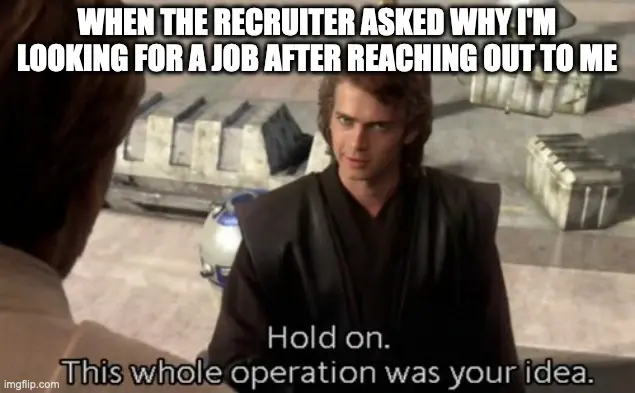this post was submitted on 10 Sep 2024
555 points (99.5% liked)
memes
9806 readers
11 users here now
Community rules
1. Be civil
No trolling, bigotry or other insulting / annoying behaviour
2. No politics
This is non-politics community. For political memes please go to [email protected]
3. No recent reposts
Check for reposts when posting a meme, you can only repost after 1 month
4. No bots
No bots without the express approval of the mods or the admins
5. No Spam/Ads
No advertisements or spam. This is an instance rule and the only way to live.
Sister communities
- [email protected] : Star Trek memes, chat and shitposts
- [email protected] : Lemmy Shitposts, anything and everything goes.
- [email protected] : Linux themed memes
- [email protected] : for those who love comic stories.
founded 1 year ago
MODERATORS
you are viewing a single comment's thread
view the rest of the comments
view the rest of the comments

Why ask?
To further solidify the notion that you, as a recruitee, must show total devotion and unwavering loyalty to a potential employer.
Obviously recruiters know that people jump around after contracts or when they feel they are not being paid enough, that people scatter shot apply to anything like guys swiping on tinder because their prior experience trying to get a job has shown them that there's really no rhyme or reason to it, that desired qualifications are nearly always absurdly niche or dramatically overinflated, and that there's a hundred or a thousand people applying to every job opening.
It is literally their job to facilitate this process. Of course they know how all if this works.
This rhetoric is basically an attempt at conditioning you into being servile. If you 'play ball', you might get this particular job, and then they'll basically lie to you about upward mobility, job stability or repeating contracts.
They are salesman. They sell the job to you and you to the company.
Why would they be anything other than slimy underhanded liars?
Or, to frame it a different way:
Modern work enviornments being what they are, as a worker you will be required to have some bare minimum soft skills in order to interact with co-workers and your boss in a manner that isn't completely deranged.
Shitty questions like these, with an obvious difference between the blunt honest answer and the "workplace acceptable" answer, serve as quite possibly the lowest bar possible to measure your ability to cater your communication properly to an audience.
These stupid questions are a litmus test for whether you are capable of reasonably functioning socially in a work environment. Very few jobs exist where you never interact with others.
I'd rather not spend my 8 hours a day listening to someone rant constantly about UBI and hating the job. That only makes the grind worse and drag on longer, even when the complaining is on the mark.
Most of all: for as dumb as a lot of this song and dance is, very few people ask these questions because they want to. Most people in recruiting have experienced times where they skipped the stupid question, and ended up missing the red flag to not hire the person.
Ah yes, reasonably functioning... by lying your ass off so as to please those around you. Totally healthy and reasonable.
Welcome to human society.
Except that you can effectively screen for basic interpersonal skills with a casual conversation of 15 to 30 minutes where the interviewer throws in some flashpoint / hot topics and asks a few more pointed or consequential questions after a general report has been established.
Or better yet, do that with their possible coworkers, or get said coworkers to suggest topics and questions for the recruiter in the above scenario.
This is very insightful, thank you
As a programmer my soft skills are as important as my hard skills. I've never worked on software alone: coordination, coherent and clear communication, collaboration. It's all integral to the role.
I believe it is most of what has led to me being promoted up to staff eng level. I'm very good technically but so are many other engineers.
Except that you can effectively screen for basic interpersonal skills with a casual conversation of 15 to 30 minutes where the interviewer throws in some flashpoint / hot topics and asks a few more pointed or consequential questions after a general report has been established.
Or better yet, do that with their possible coworkers, or get said coworkers to suggest topics and questions for the recruiter in the above scenario.